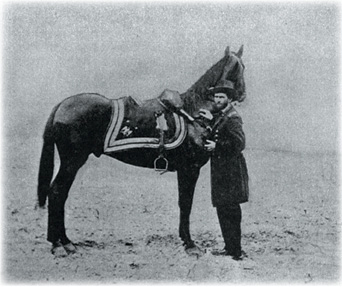When General Grant Lost His Cool

Throughout his life, Ulysses S. Grant had a special connection with horses. Among the many horses Grant owned, the three that were most dear to him were Egypt, Jeff Davis, and Cincinnati.
General Ulysses S. Grant was known for his quiet, reflective personality when he commanded Union forces during the Civil War. His calm composure, even under the most trying of battlefield conditions, was a source of wonderment to his associates, as was his aversion to the use of profanity and to the inhumane treatment of animals—two frailties that were all too common among fighting soldiers.
The nearest Grant came to losing his temper in the presence of his close associate and aide, Colonel Horace Porter, was once during an especially critical engagement late in the war, when the general’s party happened upon the scene of a Union teamster utterly beside himself with fury, trying in vain to persuade a team of horses to pull an army wagon out of a mud hole.
The agitated teamster was whipping and flogging the horses and reviling them in the most abusive terms when Grant rode up. Leaping from his saddle and clenching his fists as he ran, Grant charged up to the offending soldier and demanded, “What does this conduct mean? Stop beating those horses!”
The enraged teamster finally calmed down when he saw that the general meant business, but not before taking another healthy swing at the reluctant horses.
Grant ordered the man seized and disciplined on the spot. But the incident continued to rankle the mind of the commander, who mentioned it several times to Porter, even as bullets were flying around them in the heated battle that followed.
By nightfall, Grant was still upset and, over supper, was moved to say, “If people only knew how much more they could get out of a horse by gentleness than harshness, they would save a great deal of trouble for both the horse and the man.
“A horse is a particularly intelligent animal; he can be made to do almost anything if his master has the intelligence to let him know what is required….”
His confrontation with the teamster, wrote Porter in his memoirs, “was the one exhibition of temper manifested by Grant during the entire campaign, and the only one I ever witnessed during my many years of service with him,” which included the postwar period when Grant was president.
Later, while sitting quietly around the campfire one night, Porter asked the leader of Union armies how it happened that through all the rough-and-tumble of army service and frontier life, he had never been provoked into swearing. Grant replied thoughtfully, “Well, somehow or other, I never learned to swear. When a boy, I seemed to have an aversion to it, and when I became a man I saw the folly of it. I have always noticed, too, that swearing helps to rouse a man’s anger. And when a man flies into a passion, his adversary who keeps cool always gets the better of him.
“In fact, I could never see the use of swearing. I think it is the case with many people who swear excessively that it is a mere habit, and that they do not mean to be profane. But, to say the least, it is a great waste of time.”
 Fast Fact: More than 1.5 million horses and mules were killed, wounded, or died of disease during the Civil War.
Fast Fact: More than 1.5 million horses and mules were killed, wounded, or died of disease during the Civil War.